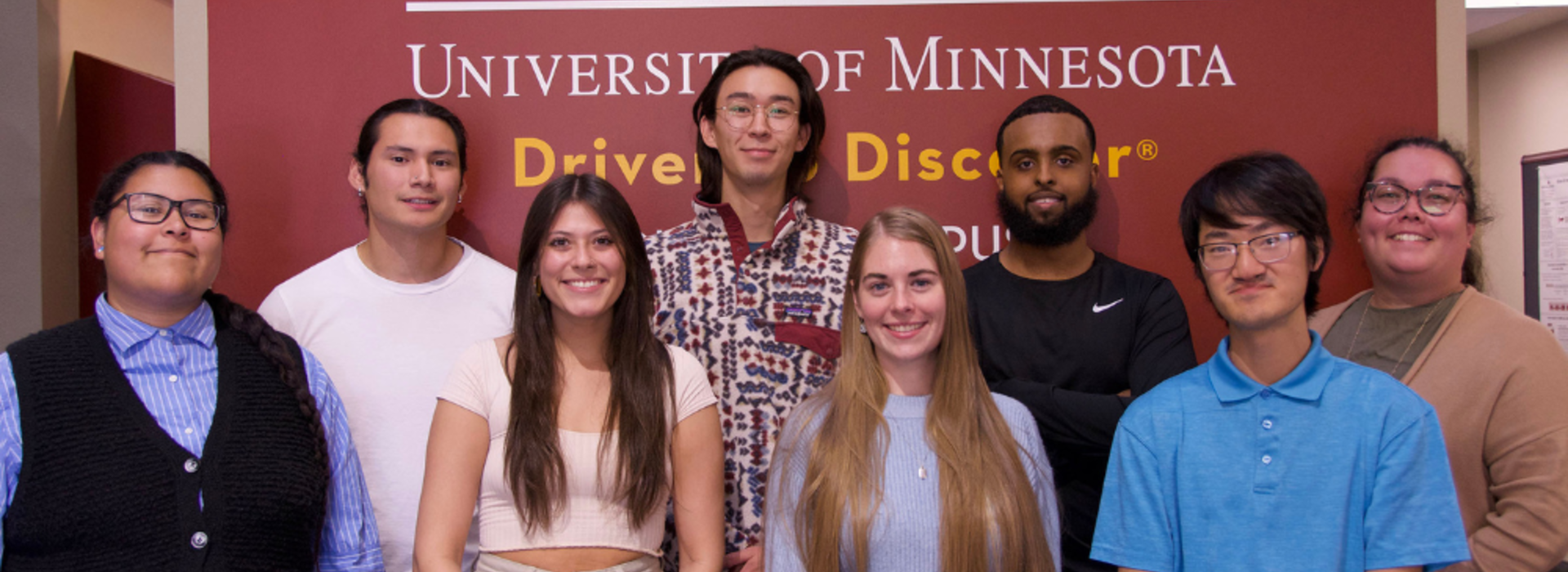
Medical School Duluth Campus’ Gateways to Medicine and Research Program Welcomes First Cohort
This fall, a group of eight college graduates from underserved backgrounds became the very first cohort of the University of Minnesota Medical School Duluth Campus’s new Gateways to Medicine and Research Master of Science program. Designed for students interested in continuing their education in medicine or research, the program consists of two tracks: a 1-year medical track for students looking to boost their medical school applications, and a 2-year research track for students preparing for careers in biomedical research and PhD programs.
The program’s development was spearheaded by Drs. Benjamin Clarke, Lynne Bemis, Jean Regal and Pedro Fernandez-Funez, who now acts as the director of Gateways to Medicine and Research. The Lloyd K Johnson Foundation was critical for the development of the program, and the Genentech Innovation Fund is a funder of its Indigenous mission.
“The purpose of this program is to prepare students that have an interest in medicine or PhD programs but find themselves not ready,” Dr. Fernandez-Funez says.
Getting into medical school or a PhD program requires both a competitive GPA and a wealth of clinical and research experiences. But there are many factors that might inhibit a student from getting these things in undergrad, like health issues, working full time during school or simply not realizing their interest in medicine or research until later in their academic career.
“These students are still highly deserving of an opportunity to go to medical school or pursue careers in research,” Dr. Fernandez-Funez states. “And so our job here is to tell them there is a pathway for their career goals .”
Knowing that hands-on experience is crucial to pursuing careers in medicine or research, each track is designed to give students opportunities like developing independent research in a laboratory setting, presenting a thesis, shadowing physicians and working with community organizations in their areas of interest.
In keeping with the Medical School Duluth campus’s mission to be a leader in educating physicians who serve the needs of rural Minnesota and Native American communities, the Gateways to Medicine and Research program is focused on recruiting underrepresented groups, including rural residents and Indigenous and BIPOC students.
“There is an important need for healthcare in rural Minnesota, and what the Duluth campus has done for five decades is show that if you recruit students from rural Minnesota, they’re more likely to return to rural Minnesota,” Dr. Fernandez-Funez explains. “They think about themselves and their parents and their grandparents when they make decisions about where to practice medicine.”
One of the goals of the program is to encourage more Native students from Minnesota to pursue medical school. According to the U.S. News and World Report, there are fewer than 3,500 Native physicians in the United States, while there are nearly 9 million Native individuals in the country, making these communities highly underrepresented in medicine. Dr. Fernandez-Funez says that increasing representation will in turn increase access to healthcare for Native communities. Funding from Genentech allowed the program to waive tuition for Native students, a significant barrier to access the program.
“They’re most likely to serve their communities because they understand the problems, the needs, the culture and how to treat Native patients in a culturally sensitive way,” he says. “We need to feed our medical school with more local and regional Native students.
Of the eight students enrolled in the inaugural Gateways to Medicine and Research cohort, three are Native, and the others come from equally diverse backgrounds, including Chinese, Hmong, Somali, first-generation, and rural.
“We have a fantastic class of students that represent the diversity of Minnesota, and they also happen to be fantastic human beings that deserve to go to medical school or PhD programs,” says Dr. Fernandez-Funez. We’re very happy to have them here and to be part of their journey to bigger and better things.”